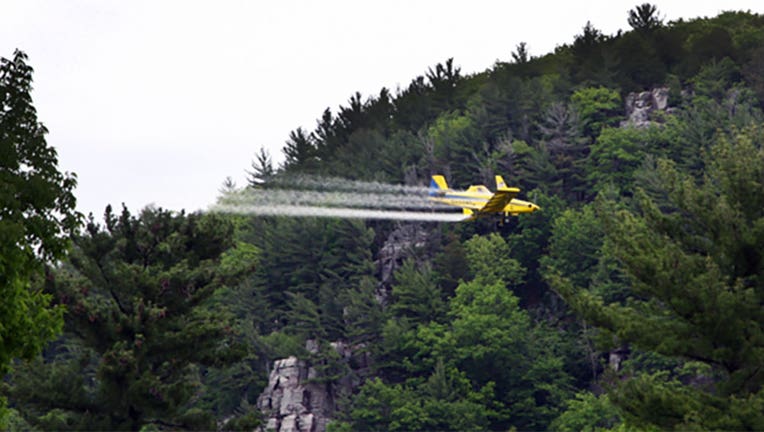Wisconsin DNR: Aerial spraying for Spongy Moth Caterpillars

The aerial spraying will occur between early May and early June, with exact dates and times depending on caterpillar development and weather conditions. / Photo Credit: Wisconsin DNR
MADISON, Wis. - The Wisconsin Department of Natural Resources (DNR) announced on Wednesday, April 17 it has finalized aerial spray plans for its 2024 Spongy Moth Suppression Program, with maps for the six selected treatment areas available online.
The six identified treatment sites contain high-value trees at DNR properties in Columbia, Marinette, Sauk and Walworth counties. A total of 928 acres will be treated with an aerial spray of Foray, a bacterial insecticide containing Bacillus thuringiensis var. kurstaki.
The specific sites and areas to be sprayed are:
- Walworth County: 124 acres at Big Foot Beach State Park and 49 acres at Kettle Moraine State Forest – Southern Unit
- Columbia County: 101 acres at MacKenzie Center
- Marinette County: 255 acres at Governor Earl Peshtigo River State Forest
- Sauk County: 212 acres at Devil’s Lake State Park; 187 acres at Mirror Lake State Park
A news release says the aerial spraying will occur between early May and early June, with exact dates and times depending on caterpillar development and weather conditions. The DNR intends to avoid spraying high-use properties during the extended Memorial Day weekend if spraying has not occurred.
SIGN UP TODAY: Get daily headlines, breaking news emails from FOX6 News
Wisconsin’s first known spongy moth egg hatch was reported on the morning of April 17, making it likely that aerial treatments in southern counties will be completed well in advance of the Memorial Day weekend.
Law enforcement, local governments, schools and nearby medical facilities will be notified before spraying.
The DNR’s Wisconsin Spongy Moth Resource Center will provide updates and additional information, and visitors can sign up for an email list to receive notice when spraying dates are determined. Additionally, the toll-free Spongy Moth Hotline, 1-800-642-MOTH (1-800-642-6684), offers a recording of up-to-date spraying plans. Callers to the hotline should choose option #1 for information on daily spraying plans.
FREE DOWNLOAD: Get breaking news alerts in the FOX6 News app for iOS or Android
Spongy moth caterpillars feed on many tree and shrub species, stripping trees of their leaves and potentially killing them. Spongy moth outbreaks occur every five to 10 years. In 2023, Wisconsin saw a record amount of spongy moth defoliation, with about 375,000 acres affected (mostly in northern Wisconsin).
Planning for a 2025 aerial spray should begin this summer or fall.

